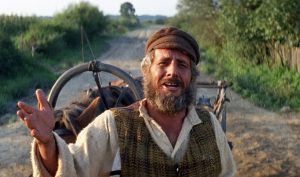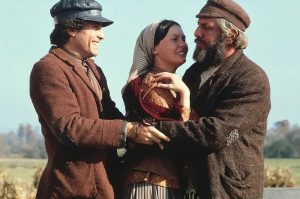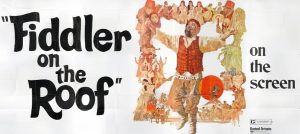Fiddler on the Roof (1971) is a musical drama film directed by Norman Jewison, adapted from the 1964 Broadway musical of the same name. The film is based on Sholem Aleichem’s stories about Tevye the Dairyman and his daughters. With its memorable music, powerful storytelling, and stunning visuals, “Fiddler on the Roof” has become a classic in the world of cinema.
Plot Overview
The film is set in the early 20th century in the small village of Anatevka, Russia. It follows Tevye, a poor Jewish milkman who struggles to maintain his religious and cultural traditions while facing the changing world around him. As Tevye tries to find suitable husbands for his five daughters, he is confronted with challenges that test his faith and his love for his family. The film explores themes of tradition, family, and resilience in the face of adversity.
Musical and Dramatic Elements
“Fiddler on the Roof” excels in blending musical and dramatic elements. The film’s iconic songs, such as “Tradition,” “Matchmaker, Matchmaker,” and “If I Were a Rich Man,” are woven seamlessly into the narrative, enhancing the emotional depth of the story. The musical numbers are beautifully choreographed and performed, capturing the spirit and energy of the original stage production.
Character Development
Topol delivers a standout performance as Tevye, bringing warmth, humor, and gravitas to the role. His portrayal of Tevye’s struggles and triumphs makes him a relatable and sympathetic character. The supporting cast, including Norma Crane as Golde, Leonard Frey as Motel, and Molly Picon as Yente, also deliver strong performances that add depth to the film.

Cinematic Elements
The cinematography in “Fiddler on the Roof” captures the rustic beauty of the village of Anatevka, providing a visually stunning backdrop for the story. The film’s score, composed by Jerry Bock with lyrics by Sheldon Harnick, complements the narrative and enhances the overall viewing experience. The production design and attention to detail in recreating the early 20th-century setting add authenticity to the film.

Flaws
Despite its many strengths, the film has some shortcomings. The pacing can be slow at times, which may test the patience of some viewers. Additionally, certain aspects of the plot may feel predictable, and the dialogue occasionally lacks depth, which can detract from the emotional impact of key scenes.
Conclusion
Overall, Fiddler on the Roof (1971) is a timeless musical drama that offers a blend of memorable songs, powerful storytelling, and strong performances. It successfully brings Sholem Aleichem’s stories to life, providing an engaging and thought-provoking viewing experience. While it may have its flaws, the film stands out for its unique blend of music and drama, making it a classic in the world of cinema.

